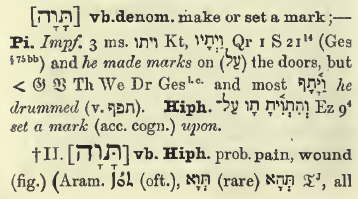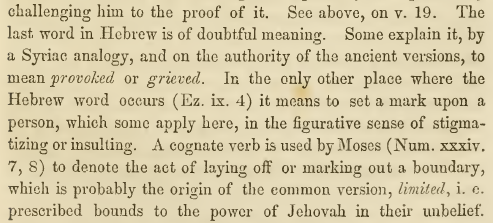Psalm 78.41 reads:
וַיָּשׁ֣וּבוּ וַיְנַסּ֣וּ אֵ֑ל וּקְדֹ֖ושׁ יִשְׂרָאֵ֣ל הִתְווּ׃
The NASB, as an example of a normal translation, reads:
Again and again they tempted God, And pained the Holy One of Israel.
The NKJV reads:
Yes, again and again they tempted God, And limited the Holy One of Israel.
with a very different meaning for הִתְווּ (hīṯwû) in the second part of the verse. We will see that there is a genuine difficulty in ascertaining the meaning of the word.
The ASV reads:
And they turned again and tempted God, And provoked the Holy One of Israel.
Here, the translators have rendered וַיָּשׁ֣וּבוּ (wayyāšûḇû) with ‘and they turned again’ rather than with ‘again and again’. The verb שׁוּב (šûḇ) in its Qal form as here, can mean ‘turn back’, ‘return’, but it can also mean ‘do repeatedly’, so either way of translating is within the lexical range of the word.
psalm 78.41 in the ‘passion translation’
In the ‘Passion Translation’, however, Brian Simmons has this verse as:
Again and again they limited God, preventing him from blessing them. Continually they turned back from him and wounded the Holy One!
We seem to have a new and previously unknown messianic prophecy, conjured out of thin air, so to say. Israel wounded the Holy One, according to Simmons. Is there any justification for translating the verse in this way?
word by word
Let’s take this word by word. The verse again:
וַיָּשׁ֣וּבוּ וַיְנַסּ֣וּ אֵ֑ל וּקְדֹ֖ושׁ יִשְׂרָאֵ֣ל הִתְווּ׃
וַיָּשׁ֣וּבוּ (wayyāšûḇû) is the Qal wayyiqtol third person masculine plural of שׁוּב (šûḇ) which, as stated previously, means ‘return’, ‘turn back’, but can also function in effect adverbially on a following verb, with meaning ‘again’ (Holladay, שׁוּב at 2.a).
וַיְנַסּ֣וּ (waynassû) is the Piʿel third person masculine plural of נָסָה (nāsāh), which in the Piʿel form means ‘test’, ‘put someone to the test’, ‘try’ (Holladay).
אֵל is God.
So far we have:
and they turned back and tested God...
or:
and again they tested God...
וּקְדֹ֖ושׁ (ûqḏôš) begins with vav, here as a coordinating conjunction, thus ‘and’, followed by the masculine singular of the adjective קָדוֹשׁ (qāḏôš), here in its construct state. Thus, ‘and the holy (one) of’.
יִשְׂרָאֵ֣ל (yīśrāʾēl) is of course Israel.
הִתְווּ (hīṯwû) is the Hifʿil perfect third person masculine plural of תָּוָה (tāwāh). The word occurs only one other time in the Hifʿil form in the holy scriptures, in Ezekiel 9.4, where it means ‘mark’, ‘make a mark’. Holladay gives the meaning in our verse as ‘trouble’, and BDB the ‘probable’ meaning as ‘pain’, ‘wound’, suggesting ‘pained’ for its use here:
As pointed out in BDB (last line above), the word was translated παρώξυναν (‘they provoked’) in the Septuagint, perhaps providing at least part of the basis for the same rendering ‘provoked’ in the ASV, ESV, HCSB, NRSV, RSV and other English versions.
Why then does the KJV translate it as ‘limited’? Alexander gives a possible explanation. He points out that a cognate word תָּאָה (tāʾāh) was used in Numbers 34.7, 8 to denote marking out a boundary, and suggests that this was probably the origin of the KJV rendering, the idea presumably being that a boundary marks the limits of an area: 1
What, then, has Brian Simmons done with this verse? He has taken this last, rather far-fetched meaning of תָּוָה , which has no current lexical support to my knowledge, and put it in the first clause, as if it were the meaning of נָסָה (nāsāh)! The fact that Israel tested God is thus lost, and a different idea has been put in its place. He has then taken a lexical meaning of the same verb תָּוָה , ‘wounded’, and placed it where it belongs in the second clause. This would have given ‘and they wounded the Holy One of Israel’.
I suppose that he then saw that one could hardly speak of ‘wounding’ Almighty God, as if the Lord Almighty had suffered an injury, and so he decided to drop ‘Israel’ from the equation, so to say, to give ‘they wounded the Holy One’!! Apart from the fact that Simmons has no basis on which to remove ‘Israel’ in the first place, וּקְדֹ֖ושׁ is thus left hanging in the construct state, as if the verse ended ‘and they wounded the Holy One of’, followed by a full stop.
I no longer believe that Simmons is translating from the original languages at all. I do think that he is looking at the Hebrew and Greek text, and looking up the meaning of some of the words. I think he is also looking at several English versions, which indeed is not inappropriate in itself. It seems that he then throws all the various possible meanings up in the air, picks and chooses some he likes, discarding others that he does not, and reassembles them in a form which is pleasing to him.
In this case he seems to have conjured up a new idea that ‘they’ (that is, Israel, see verse 5) wounded ‘the Holy One’, who is presumably the Lord Jesus Christ (Mark 1.24, Acts 2.27). At first sight, this might seem consistent with Isaiah 53.5 (‘He was wounded for our transgressions’), but actually there it seems to be God who has wounded His own Son. So I doubt whether the idea is really biblical. But what matters most is that it is not there in the original. It has been made up by Simmons. Shame on him! May he repent and return to what I happen to believe is a genuine calling as a minister of the gospel of the Lord Jesus Christ, who he certainly loves and is much devoted to.
Andrew
Notes:
- J. A. Alexander, ‘The Psalms’, Vol. 2 (New York: Scribner, 1850) p. 203. ↩


